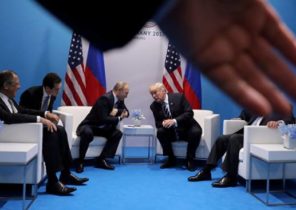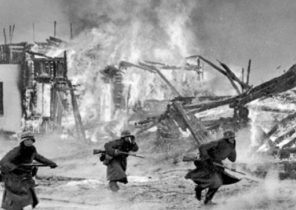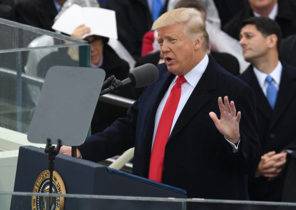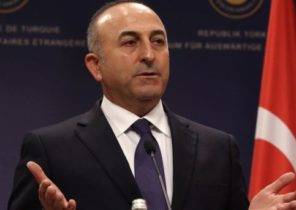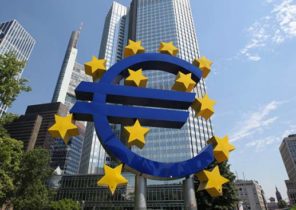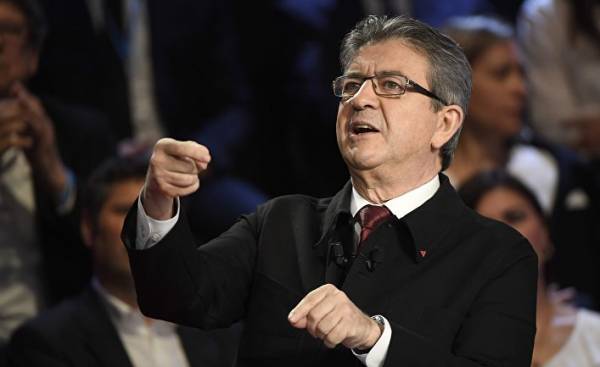
In the election campaign of French President (the first round will take place on 23 April) there was a new twist: a breakthrough ultraleft candidate Jean-Luc Mélenchon, left on the third place in rating. Mélenchon is a staunch opponent of the EU and NATO and an ardent admirer of Vladimir Putin, had no qualms about after the murder of Boris Nemtsov publicly to curse the deceased.
According to the survey conducted by Sofres Kantar-OnePoint, for Mélenchon now ready to vote 18% of voters. Thus, he surpassed the center-right candidate françois Fillon (17%). The leaders of the presidential race, marine Le Pen and Emmanuel macron lost a few points (both 24%), and socialist Benoit Hamon retreated far back (9%).
The leader of the movement “Rebellious France,” Jean-Luc Mélenchon has refused to offer Amon to join him, and for several weeks his rating is growing rapidly. A brilliant orator, the recognized winner of the presidential debate on 4 April, 65-year-old Mélenchon completely changed the situation on the left flank. He impresses more and more voters, but a major concern for others. “The tribune”, “a fighter for the rights of peoples”, “revolutionary”, “French Bernie Sanders” — and at the same time, “populist”, “utopian”, “souverainist”, “fan of the Kremlin”.
A philosopher by training, in his youth, a Trotskyist, and later switched to a less radical forms of socialism, Mélenchon was an admirer of President Francois Mitterrand and worked in the socialist government of Lionel Jospin from 2000 to 2002. In 2008, he resigned from the socialist party because of the “roll it right” and founded his own left-wing movement, which in 2016 is called “Rebellious France.” Jean-Luc Mélenchon calls to commit “civil revolution” — a popular revolution, participation in which will be not only working class but also all citizens.
To return power to the people, Mélenchon proposes to abandon the Fifth Republic (the constitutional system of France since 1958), which he calls “presidential monarchy” and “oligarchy.” The main point in its programme the convocation of the Constituent Assembly, which adopted the new Constitution that allows citizens to control their elected representatives and most of them require.
In addition, Jean-Luc Mélenchon promises many social transformations of the left: redistribution of income in favor of the poor, increase taxes for big business, huge investments in clean energy sources. To Finance all these measures, according to Mélenchon, you need to end the policy of austerity and to invest in the economy 100 billion euros. The main obstacle to the realization of this ambitious social policy is the EU in its current form and contracts, strictly regulating the budget deficit, says leftist candidate and his supporters. After coming to power, “Rebellious France” is going to put the Brussels ultimatum: either we change the conditions and treaties of the EU, or France out of the Union.
Of mélenchon and his supporters are not satisfied with not only the financial and economic dictates of the EU, but “the making of Europe anti-Russian course under the pressure of the United States”. Unlike most socialists, it is highly critical-minded in relation to the Kremlin, Mélenchon is considered Pro-Russian and, moreover, the Pro-Putin politician. As caustically stated by the socialist Benoit Hamon, who Mélenchon takes away the voice: “My main difference from Mélenchon is that I don’t think it is right alignment with the Kremlin.”
The charges of Jean-Luc Mélenchon of Putinism began to sound in 2014 amid the political crisis in Ukraine. Levoradikal said that US and NATO used the events in Ukraine to provoke Russia and that Moscow’s actions in Crimea “absolutely predictable.” Mélenchon spoke out against any anti-Russian sanctions and called the new Ukrainian government a “coup-adventurers who are under the influence of neo-Nazis”. “Western countries are behaving irresponsibly. The situation got out of control North American puppeteers who wish to push the boundaries of NATO to strike Russia, that is unacceptable, stupid, irresponsible and provocative,” he said.
During the debate on 20 March between Mélenchon and Amon was skirmish on the issue of Crimea. “The first thing Europe needs to convene a conference of security from the Atlantic to the Urals. All conflicts happen due to the fact that after the collapse of the Soviet Union any negotiations on the borders was carried out. The time has come for these negotiations to conduct. Where should be the border between Russia and Ukraine? What solution should be implemented: Khrushchev’s decision or the decision of Putin? I don’t know. But I personally see the connection between Crimea and Russia. We need to talk about it,” said Mélenchon Amon, condemned the annexation.
Another reason to blame the Mélenchon Putinism was the support of Russian actions in Syria. The candidate spoke about his faith in Putin’s ability to destroy ISIS and condemned the French press for his anti-Russian line. A chemical attack in Idlib and rocket attacks on Syria by the United States again raised the Syrian issue in the top of the political agenda. Condemning the chemical attack, Mélenchon criticized Washington and European leaders who support give Donald Trump the opportunity to “unilaterally decide when and where to strike.”
Distancing himself from NATO and the European politicians, “blindly obeying the Alliance,” Mélenchon promises to bring France first from NATO’s military structures, and then from that organization. France, he said, not only Western, “universal nation, which is nothing to do in the Alliance,” whose actions Mélenchon denounces. Thus, “the expansion of NATO to the East”, in his opinion, creates useless tension in relations with Russia.
However, more than Pro-Russian stance in foreign Affairs, observers surprised by the attitude of Jean-Luc Mélenchon to opponents of the Kremlin. Particular outrage from many experts of Russia in France caused a reaction policy on the murder of Boris Nemtsov. In his blog shortly after the assassination of Jean-Luc Mélenchon called Nemtsov “a man hitherto unknown”, “political fraud of the epoch of Yeltsinism” and “a supporter of the enemies of Russia”. “After the family of the deceased primary victim of the murder can be considered to be Putin, against whom is conducted the strategy of “saddamization” — spoke then Jean-Luc Mélenchon.
According to the analyst, Cecily Vessey, author of the book “Kremlin network in France,” these statements caused a big scandal: “Why French politician feels he has something to write about it? Especially on a murdered man?” — angry, Vessey. In the same blog post Mélenchon called Alexei Navalny “racist and xenophobic”, not mentioning a word about his anti-corruption activities. Their opinion has not changed two years later. In a television interview in February this year on the question of the leader of the Germans Mélenchon said: “do you Know what it’s odious anti-Semite?”
And when surprised, the leader asked, whether it confuses Nemtsov with someone else, a politician unequivocally admitted his mistake and tried to cover up the embarrassment by calling for the release from prison of the leader of “Left front” Sergei Udaltsov. By the way, Udaltsov is a favorite of Jean-Luc Mélenchon on the Russian political scene.
The leader of the “Rebellious France” systematically rejects accusations of sympathies to Putin: “I had nothing to do with Vladimir Putin. I am categorically against its policies, and if I were a Russian, I would vote not for the party and for my friend from the “Left front”, who is now in prison. But, although I had nothing to do with Putin, I’m not going to be part of the choir of raving, hoping for a conflict with Russia. I stand for peace,” says Jean — Luc Mélenchon.
His adviser on international Affairs of the George Palacio, Cecily Vessey and some other experts believe the “man of extremist views, especially about Russia.” According to Vessey, who read the lecture about the Kremlin networks in France: “Palacio through the wife Russian Embassy. For him, the USSR is a good example to follow. He hails from Communist Yugoslavia and is sorry that she’s gone. I’m not saying he’s a Russian agent. I just notice that in all of Jean-Luc Mélenchon defends Putin, in particular, through his Advisor.
He organized at least one demonstration on the Donbass, working with someone who works at the Russian Embassy. This show is very reminiscent of the old “policy of peace” of the Soviet Union, with slogans against war and the terrible pictures of dead children. I have no evidence that it paid shares. But the fact that he has a personal relationship with the Russian representatives, is a fact.”
According to the researcher, the love for Putin by the French ultra-left due to their attachment to the Soviet myths. However, Vessey acknowledges that no evidence of their bribing Russia have never been charged. Moreover, the Mélenchon campaign has condemned the visit of marine Le Pen to Russia and her meeting with Putin, as well as visit other candidates to various world leaders.
I must say that because of the support of Putin and other common items many observers compare of Mélenchon with marine Le Pen. For their angry denunciations of “elites” and the “system” they are regularly branded as “populist”. Here is what French philosopher, human rights activist and journalist Bernard-Henri levy: “Notice how in the debate assents Mélenchon, Le Pen, when she talks about Europe or NATO. Let’s see how his words and angry attacks against the elites is similar to the right-wing attacks. Listen to how he appeals to the nation — it’s akin to boulangisme a combination of cult of personality and populism.
“Rebellious France”, you say? Isn’t it strange that whenever the people rise against the dictatorship, Mélenchon supports dictators and not the people. It is for Putin and not for the Bulk. He brings the fight for democracy in Syria to the conflict around oil and gas, and the last word leaves Bashar al-Assad. The struggle of Ukrainians for independence is “an imperialist conspiracy avantyuristov-coup.” The Dalai Lama and Tibetans he was accused of seeking to establish a “Buddhist Sharia”. And in Latin America, instead of supporting human rights defenders, he sings odes to Chavez and Castro!”
Comparisons with Le Pen Mélenchon finds offensive and they always sharply retorted. However, such comparisons are unacceptable, and many of the French analysts. According to Jacques Dion from the magazine “Marianne”, the media wrongfully compared the new left movement with the right-wing, that is, heirs of the Resistance with the ideological descendants of the collaborators, calling those and other populists.
What Mélenchon agreed with Le Pen on some issues, puts them in a row. Like the fact that Mélenchon supports Putin’s policies in some areas, does not make him a fan and a puppet of Putin, says columnist “Marianne”.
The leader of “the Rebellious French” rather operates on the principle that “the enemies of my enemies are my friends” and sees the Kremlin’s tactical ally in the fight against the monopoly of the United States in the world. “Jean-Luc is absolutely not tolerate Americans, whoever was standing there at the head of their country — said his former colleague in the socialist party, Julien dray. American imperialism is for him — an absolute evil. Based on this, the enemies of his enemies become his friends.
In the 70-ies of the USA staged in Latin America, the coups, supported right-wing dictatorship. Jean-Luc moved closer to Chilean political refugees when I was working in the city hall of MASSY, who took a lot of people. He spoke perfect Spanish and defended these Chileans. Perhaps his sympathy for Putin is rooted here — in opposition to American interventionism”.
Seeing himself as the heir of de Gaulle and Mitterrand, Mélenchon reminds us that General de Gaulle had to negotiate with Stalin, and Brezhnev, and Mao. “When the time comes, I’ll find a way to negotiate with Mr Putin, he promises. — This is necessary in order to prevent war on the continent.”
